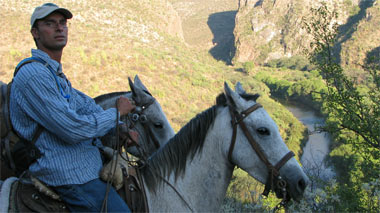
Graduate researcher wins fellowship -- Steven Borrego, a graduate student in zoology at Southern Illinois University Carbondale, uses a horse to traverse the Mexican state of Sonora where he tends to the motion-activated cameras used to study the local wildlife population. Borrego, along with SIUC Associate Scientist Clay Nielsen, are conducting the study, which involves jaguars and other wildlife. Borrego recently won a prestigious graduate research fellowship from the National Science Foundation, which he will use to continue his work in Sonora and beyond. (Photo provided) Download Photo Here
August 14, 2009
Graduate student wins prestigious NSF fellowship
CARBONDALE, Ill. -- A graduate student at Southern Illinois University Carbondale is the recipient of a prestigious fellowship from the National Science Foundation.
Steven Borrego, a master’s student in zoology, received a graduate research fellowship from NSF. Borrego will receive an annual stipend of $30,000 per year for three years, plus all tuition and fees.
“The competition for these prestigious NSF graduate fellowships is keen,” said John A. Koropchak, vice chancellor for research and graduate dean. “It is a great honor for Steven to receive one, and a testament to the quality of our Wildlife Research Lab and Zoology programs.”
Borrego, of Austin, Texas, will use the fellowship to complete his ongoing work with Clay Nielsen of the SIUC Cooperative Wildlife Research Laboratory and Department of Forestry on jaguars and other wildlife in Sonora, Mexico. Once he completes his master’s degree next year, he can use the two remaining years of the fellowship to pursue his doctorate at SIUC or any other university.
Borrego said he was surprised to win the fellowship because his work was up against so many other worthy projects around the country.
“I know so many other graduate students who have great projects, so this is really nice,” he said. “It takes a lot of energy to apply for fellowships and grants, so it’s nice when it pays off.”
Borrego’s current project has him working in the field in the desolate Sierra Madre Occidental. Borrego lives with modern day cowboys, known locally as “vaqueros,” in Spartan conditions for weeks at a time.
Borrego said Nielsen strongly encouraged him to apply for the fellowship.
“He is instrumental in helping graduate student with this process and pushing us to write proposals and such,” Borrego said. “It’s hard to separate the money from the research. If you don’t have to worry about your bills as a grad student you can concentrate on your work. This is a real feather in the cap, not only for me, but the University as well.”
Nielsen said Borrego’s field experience has paid off for the project.
“Steven has been the ideal graduate student for this very challenging international research project,” Nielsen said. “I couldn't have chosen a better student for this work.”
The NSF awards up to 1,600 graduate fellowships, depending on its financial resources in a given year. Graduate research fellowships are aimed at helping top students who are in the early stages of a graduate program in disciplines relevant to the NSF’s mission, and who demonstrate their potential to successfully complete their graduate degrees.
